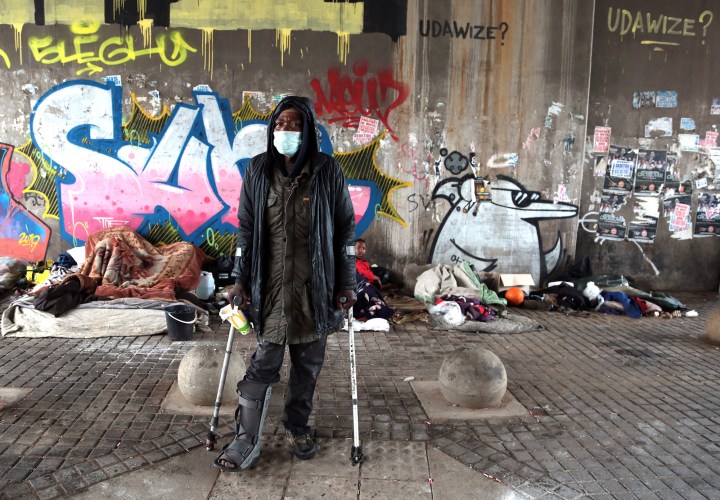DM168 Feature
‘Skarrelling’ on the streets: lockdown leaves people with nowhere to call home

‘The longer you’re on the streets, the worse you look, the worse you feel – and, eventually, you’re working harder than you’ve ever worked in your life to survive.’ Sandisiwe Shoba looks at homelessness in the time of Covid-19.
First published in the Daily Maverick 168 weekly newspaper.
While there are no formal statistics on the number of homeless people in South Africa, non-governmental organisations (NGOs) around the country are saying numbers are growing during the extended lockdown, aimed at curbing the Covid-19 pandemic.
Rising unemployment and the economic fallout from Covid-19 have left many more sleeping rough on the streets
After losing his job in the tourism industry and struggling to pay his rent, 27-year-old Owen Matsela found himself living in a homeless shelter.
“The industry is just a mess and you’ve got to pay rent. The landlord won’t take your stories and you’ve got to get food as well,” he said.
Matsela is one of many who have fallen on hard times because of the pandemic. And it is the poorest of the poor who have suffered the most.
Between April and June last year, Statistics South Africa recorded 2.2 million job losses. Its latest quarterly employment statistics show formal sector jobs have dropped by more than 600,000 year-on-year.
The National Income Dynamics Study – Coronavirus Rapid Mobile Survey (NIDS-CRAM) report, which investigates the socioeconomic impacts of the national lockdown, also found that in June last year 37% of households had run out of money for food.
“There is a visible and significant increase in homelessness across our city connected to the economic impact of lockdown and Covid-19,” said Jon Hopkins, the operations director of U-turn Homeless Ministries in Cape Town. Statistics from 2020 show Cape Town already had more than 14,000 people sleeping rough.
Everywhere you look
“Everywhere you look, if you look closely in between shrubs and trees, you’ll find somebody living there,” said Carlos Mesquita, who was formerly homeless and is now the spokesperson for the Strandfontein Homeless Action Committee in Cape Town.

A man sleeps on the promenade in Durban hoping to get enough money to sleep in a shelter, 27 January 2021. Picture: Rogan Ward
The Tshwane Leadership Foundation, an inner-city community organisation in Pretoria, said it was distributing more food than it did before.
“We have increased our food parcel programme to migrants and it has led to increased social work services among the migrant families too. We also provide food to struggling tenants in social housing programmes, where jobs were lost and income reduced,” said CEO Wilna de Beer.
Similarly in Durban, the Denis Hurley Centre said it had increased the number of daily meals it served from 200 to nearly 300.
“This is partly because there are more hungry people around (even if not homeless) and also because most of the other feeding programmes have not reopened,” said Raymond Perrier, the director.
Doorway to Dignity in Johannesburg said job losses and the subsequent increase in homeless people was putting strain on shelters and feeding schemes.
“The number of destitute and marginalised people has increased and in some areas nearly doubled,” said CEO Trevor Webster. Statistics from last year show Johannesburg has more than 15,000 homeless people.
Across South Africa, shelter accommodation is hard to come by, partly because shelters limit the numbers of people they accept for physical distancing purposes.
And, according to Webster, many of Johannesburg’s temporary shelters set up during the hard lockdown in March last year have closed down.
Too many people, too few beds
De Beer said that in Tshwane there was an estimated shortage of 300 to 400 bed spaces and at least 100 beds were needed for homeless women.
“The good news is that four temporary Covid-19 shelters have been turned into long-term shelters for homeless people. Two permanent housing facilities were also created for older homeless people to live in, safely and affordably,” said De Beer. This was in addition to 12 NGO-run shelters, one temporary and three permanent shelters owned by the city.

A woman shakes out a blanket, outside the Castle of Good Hope, in Cape Town, on 22 January 2021. In Cape Town, statistics from 2020 indicate that more than 14 000 people are homeless, a number that has likely increased as a result of rising unemployment and a worsening economy. Photo: Victoria O’Regan
Caroline Holley from Life Changer, a church-based public benefit organisation in Pietermaritzburg, said the city was in dire need of shelter space and did not have a homeless shelter for men.
Cape Town is facing a similar crisis. Bed space has been limited since the hard lockdown and, after a large temporary shelter in Strandfontein closed down (which housed around 1,500 people), many people who couldn’t find space in the city’s shelters or safe spaces landed back on the street.
For Quinton September, lockdown was the first time he had stayed in a shelter after living on the streets for 15 years. After being housed at Strandfontein, September had to find accommodation at one of the Haven’s night shelters after it closed down.
“For me, living on the street was very difficult. So now I have a chance to live my life right. I stopped using drugs and I don’t skarrel anymore,” said September.
“Skarrelling” refers to the many different activities homeless people have to undertake to make a living. This includes asking for money at traffic lights, car guarding, recycling, digging in bins for scraps of food — the list goes on.
With fewer people on the roads due to lockdown, skarrelling has become tougher than before.
“It was hard skarrelling because there was nobody. There was no cars on the street, shops were closed and stuff like that,” said September, who struggled during the early days of the hard lockdown.
A study by U-turn and the Coalition to End Homelessness found that nearly 40% of money spent on helping homelessness in Cape Town comes from support from the public — which includes giving donations directly to people living on the streets.
Shying away from shelters
This form of giving is often discouraged. It is seen as perpetuating the homelessness crisis and feeds into people’s reluctance to seek help from shelters.
De Beer said homeless people with substance addictions were often less willing to concede to sobriety rules in shelters or enter rehabilitation programmes.

A man sleeps on an unused pedestrian bridge in Durban hoping to get enough money to sleep in a shelter, 27 January 2021. Picture: Rogan Ward
“Another challenge is that not all shelters accommodate foreign migrants, and they then have to fend for themselves.”
Hassan Khan from the Haven Night Shelter Welfare Organisation in Cape Town said there was a reluctance to take up bed spaces in areas outside the city.
“The reasons appear to be wanting to be close to economic opportunities in the CBD and being able to exercise the choice of sleeping in a tent on the pavement.”
The fear of contracting Covid-19 was another repellent. However, most NGOs report that very few homeless people had contracted Covid-19, and many avoided shelters due to fears of overcrowding and poor sanitation.
People living on the streets often battle to access healthcare, a continuing trend during the pandemic.
According to Webster, street dwellers were often mistreated when they sought medical care. This often had to do with their appearance.
“As many homeless people do not have easy access to hygiene facilities, they are often treated with scorn and disdain as a result of their appearance and are loathe to seek medical care for fear of ridicule.”
Lack of access to an official ID, a physical address, contact number and finances posed additional barriers.
“With the hospital and clinic situation under the pressure it is at the moment, these individuals, who were never able to receive assistance easily, are now more challenged to receive the help they may require,” said Holley.
Treatment
The City of Cape Town, though it was criticised for the conditions of the facility at Strandfontein, said it was able to provide medical care to homeless people who otherwise would not have received it.
Zahid Badroodien, the mayoral committee member for community services and health, previously told DM168 that approximately 85% of the residents at Strandfontein were treated for conditions such as TB, HIV, diabetes, hypertension and epilepsy.

Xolani Nene begs on the side of Berea Road in Durban hoping to get enough money to sleep in a shelter, 27 January 2021. Picture: Rogan Ward
Twenty-three-year-old Rodrick Paul, who we bumped into in Sea Point, in Cape Town, lost his job as a caretaker when the Covid-19 lockdown struck.
“I’ve faced a lot of challenges,” Paul said about living on the streets. “For example, I struggled to find food because my money was finished.”
According to Hopkins, the broader economic fallout of the lockdowns has left more people unemployed and vulnerable on the streets of Cape Town — a sentiment that rings true for the rest of South Africa.
Perrier said that competition for jobs (which are few) had increased and homeless people who usually survive on so-called “piece jobs” and hustling are “at the back of the queue”.
Flawed and insufficient
De Beer suspects the number of young homeless people going to cities such as Pretoria to find work will grow.
And a shared concern was that current interventions were flawed and insufficient.
“Almost every homeless person should have received the tiny R350 per month grant – after all, they are all unemployed,” said Perrier. “And yet, as far as we know, fewer than 20% have seen any money.”
He criticised the requirements to access the distress grant, for example, having access to a smartphone and bank account, which many of the homeless are without.

Joseph Sikiyani (35), in the bedroom he shares with his wife and six month old son, in ‘Our House’, Oranjezicht. ‘Our House’, was a backpackers which closed due to lockdown and is now an independent living area for homeless persons and families. At present, around 30 people reside in the house; some are working and pay rent while others are currently staying there for free. (Photo Victoria O’Regan)
For Webster, the government’s social development entities need to work more closely with NGOs, which are doing the work on the ground. “They work daily with people living on the street and have a sound understanding of their needs and how to address their concerns,” he said.
Mesquita said interventions to alleviate homelessness should not be formulated without consulting those who know first-hand what it’s like to sleep rough.
“The longer you’re on the streets, the worse you look, the worse you feel and, eventually, you’re working harder than you’ve ever worked in your life to survive,” he said.
“I’ve never worked as hard as when I skarrelled. I was up at dawn and I’d only slept for two hours. That’s why a lot of people get involved with tik and those kinds of things – to stay awake and to keep going.
“Can you imagine living your life that way, where you don’t know where you’re going to lay your head down at night?” DM168
This story first appeared in our weekly Daily Maverick 168 newspaper which is available for free to Pick n Pay Smart Shoppers at these Pick n Pay stores.





















 Become an Insider
Become an Insider
Comments - Please login in order to comment.